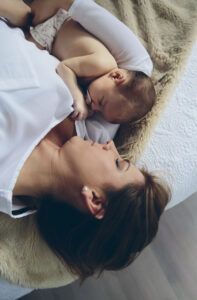Co-Sleeping
 Co-sleeping is the practice of sleeping with your newborn baby. There are many schools of thought and opinions on the safety, psychological effects and risks associated with the practice. Reviewing factual studies and professional resources on co-sleeping highlights that wanting to sleep with our infants and young children is perfectly natural, and only increases the risk of SIDS by 0.004%. When compared to the 0.006% chance of an infant dying from SIDS alone in their crib, the numbers speak for themselves.
Co-sleeping is the practice of sleeping with your newborn baby. There are many schools of thought and opinions on the safety, psychological effects and risks associated with the practice. Reviewing factual studies and professional resources on co-sleeping highlights that wanting to sleep with our infants and young children is perfectly natural, and only increases the risk of SIDS by 0.004%. When compared to the 0.006% chance of an infant dying from SIDS alone in their crib, the numbers speak for themselves.
Basic Benefits
Western culture has a history of separating mothers and babies at night, compared to other parts of the world that encourage co-sleeping more. As most mother know, sleeping separately from the baby leads to many sleepless nights for all members of the family, physical exhaustion for the caretakers, and of course a disruption of the sleeping cycle that transfers over to the next day.
Though many may believe that adult beds are not safe for the baby—and there is merit to that opinion—what the other school of thought boils this down to is the way in which the mother’s body cocoons the infant to protect it while sleeping. Similar to that is the positioning of the mother’s body when breastfeeding: she bends to form a protective shell around her baby. Mother and infant heartbeats and breathing both slow. The mother’s heartbeat soothes her infant, and the carbon dioxide the mother breathes out stimulates her baby’s breathing.
When co-sleeping, these same positive effects occur, and studies show that the babies move far less when sleeping with their mother than sleeping in their cribs alone, where they tend to toss and turn all through the night.
Tips for safe co-sleeping include:
- Guardrails to prevent the baby from falling off the bed.
- Position the baby adjacent to the mother instead of between the mother and father.
- Large beds, king-sized in particular, allow for plenty of space for safe co-sleeping.
- Make sure to place the baby on their back while sleeping.
- If placing the baby in your bed isn’t possible, a crib next to the bed keeps the baby at arm’s reach.
Do not co-sleep with your baby or young child if you are under the influence of alcohol or any drug, including sleeping medications or sedatives. Also, if you’re overly exhausted, avoid co-sleeping and breastfeeding on extremely soft surfaces to not accidentally cut air flow to your child. If you are extremely obese or the child’s babysitter, co-sleeping is highly advised against.
Behavioral and cognitive development outcome studies also show that co-sleeping is not only safe and healthy but promotes healthier minds and bodies while children grow as well. Consult your GP or OBGYN if you have any questions or concerns about co-sleeping, or for individualized advice.
